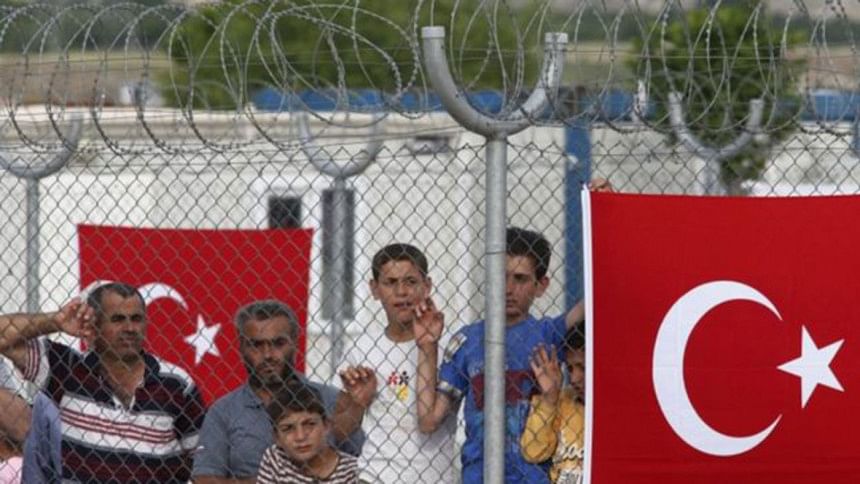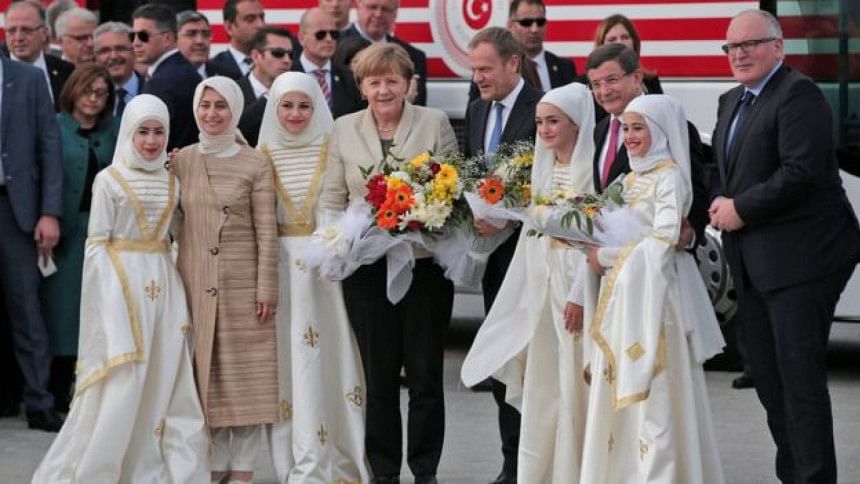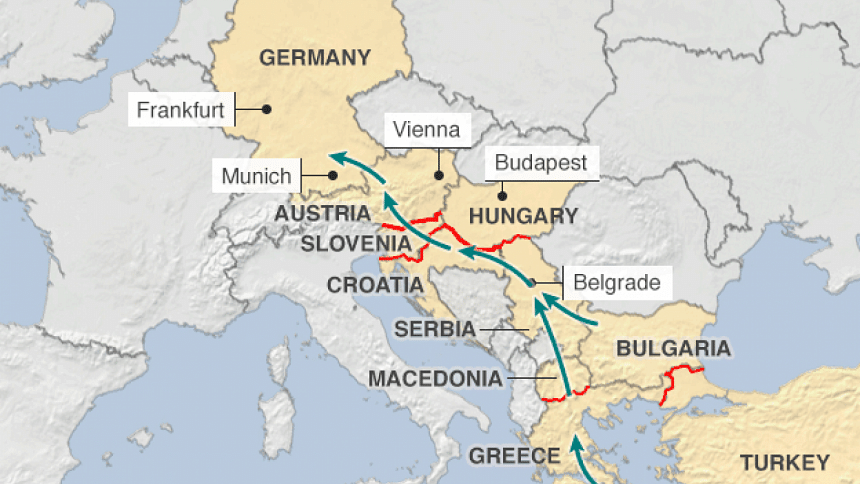Migrant crisis: EU-Turkey deal is 'working'

Last month's EU-Turkey deal on tackling the migrant flow has begun to produce results, a top EU official has said.
"We have seen a sharp reduction of the illegal migration flows," European Council President Donald Tusk said.
In Turkey, he praised Ankara as "the best example in the world on how to treat refugees", despite criticism by rights groups of the agreement.
Turkish PM Ahmed Davutoglu reiterated the EU should now implement visa-free travel for Turks as part of the deal.
Davutoglu said his country had fulfilled its part of the agreement and "the issue of the visa waiver is vital for Turkey".
Earlier on Saturday, Tusk - along with German Chancellor Angela Merkel - visited a migrant camp on the Turkish-Syrian border.
The goal of the March deal is to deter migrants, mainly Syrians and Iraqis, from making illegal crossings - mainly by sea - between Turkey and Greece, an EU member.
The UN refugee agency and other rights organisations have voiced concerns about the agreement under which such illegal migrants are transported to centres in Turkey.
'SANITISED' VISIT
At a joint news conference in the southern city of Gaziantep, Tusk said: "Our return operations are working in tandem with resettlements of Syrian nationals from Turkey to EU member states, demonstrating the desired shift from illegal to legal migration."
"No-one has a right to lecture Turkey on what it should be doing," he added.
Davutoglu said "the decrease (in numbers) is evidence that the mechanism that we have set up works".

"Not a single Syrian refugee has been returned from Turkey unless it is of their free will," the Turkish prime minister said.
Meanwhile, Merkel called for the establishment of special security zones on the Syrian side of the border, where refugees could find shelter.
"The more secure people can feel the less likely it is that they'll have to leave their homeland. So this is why we attach great importance to that," she said.
During the visit to the Nizip migrant camp, the EU officials met children and inspected living conditions. The camp is home to some 5,000 people.
Human rights groups criticised the visit as "sanitised".
Under the agreement, migrants who have arrived illegally in Greece since 20 March are expected to be sent back to Turkey if they do not apply for asylum or if their claim is rejected.
Opponents question its legality and argue that Turkey is not a safe place to return people to.
SATIRE ROW
Saturday's visit to the Nizip camp reflects an anxiety to see improvements in living conditions there.
However, Human Rights Watch (HRW) said the EU officials had chosen to visit a "sanitised refugee camp".
Judith Sunderland, HRW acting deputy director for Europe and Central Asia, said the delegation should instead visit camps for the displaced on the other side of the border "to see the tens of thousands of war-weary Syrian refugees blocked" by Turkey from entering.

Officials there said those arrested "wanted to attack dignitaries of the state and strategic targets".
DEAL'S FIRST MONTH
Under the EU-Turkey deal, for each Syrian migrant returned to Turkey, the EU is due to take in another Syrian who has made a legitimate request.
The scheme has reduced sharply the number of arrivals, from more than 56,000 in February to around 7,800 over the past 30 days, according to the European Commission.
However, the International Organization of Migration said unofficial data for arrivals in Greece in recent days suggested the numbers were picking up again.
And the promised relocation of migrants to EU countries seems to be slow as nations are reluctant to take in more migrants - 103 Syrians have been resettled from Turkey to Europe, the commission said.
Rights organisations have attacked the scheme, with Amnesty International saying that Turkey has illegally returned Syrians to their country, a charge Ankara denies.
The EU has pledged up to $6.8bn (£4.5bn) in aid to Turkey over the next four years and the main focus of this latest visit is on how to begin spending that.
Ankara, however, expects more, and has warned the EU deal may collapse if travel restrictions for its citizens are not eased as agreed.
The deal says Turkey must meet 72 conditions by 4 May to earn access to the EU's visa-free Schengen area, but diplomats say only half of those points have been met so far.
Turkey already hosts some 2.7 million Syrian refugees, at a cost of over $10bn (£7bn), the government says.
Merkel's trip comes as she faces additional pressure for agreeing to the prosecution of German comedian Jan Boehmermann, who is accused of insulting Turkish President Recep Tayyip Erdogan by reading out a satirical poem.
Advocates of freedom of speech in both Turkey and Germany have called on her to send out a strong message on the issue during her visit.

 For all latest news, follow The Daily Star's Google News channel.
For all latest news, follow The Daily Star's Google News channel. 







Comments